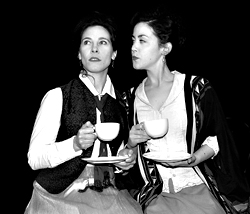There is something refreshingly unheavy about Seattle Public Theater’s current production of Travesties, a brisk comic romp set amid the high-powered intelligentsia that serendipitously gathered in “mystically neutral” Zurich in 1917, while on the European front the so-called Great War ran its bloody course. As in any Tom Stoppard work, language itself becomes a protagonist here, as a handful of witty characters bandy about effervescent repartee and the endlessly amusing word games of the extra-smart. Stoppard ups the ante on the semantic shenanigans by centering his genius for wordplay in three historic personages of literary repute: James Joyce (Jon Lutyens), Lenin (Dennis Kleinsmith), and Tristan Tzara, the founder of Dada (Frank Lawler). It’s just too perfect; if such a ripe convergence hadn’t actually occurred, Stoppard would have invented it.
Structurally, Travesties is a riff on Oscar Wilde’s The Impor-tance of Being Earnest, a roman-tic mistaken-identity farce cleverly referenced several times during the play. Set predominantly in a library and strung together as a series of reminiscences, Travesties is narrated by one Henry Carr (an excellent Gavin Cummins). A consular official stationed in Zurich (who, in real life, was chosen by Joyce to play Algernon in a production of Earnest), Carr is the quintessential unreliable narrator. With his Swiss-cheese memory and myopic self-importance, he comes across as something of a Magoo, a booming, pedantic artist manqué bumbling at the outskirts of celebrity (“His genius was never in doubt,” he says in turn of Joyce and Lenin). The story he tells, a fragmented, episodic tale of convoluted romance and slapstick revelations, involves the aforementioned celebs and their objects of woo: the librarian Cecily (Tracy Repep), the assertive amanuensis Gwendolyn (Hana Lass), and Nadya (Therese Diekhans), a Russian compatriot of Lenin.
As these various characters execute their farcical waltz, coupling and uncoupling in a dizzying spin of hide-and-seek, Travesties becomes an elevated but playful argument about art itself. More specifically, the play turns on the timely question of art’s value in an era of global war and apocalyptic destruction. Is the artist a canary in a coal mine, warbling a warning about the poison in the air? Or is art just child’s play, an apolitical frivolity that blithely sings while the empire burns? In Stoppard’s hands, such a heady debate takes a distinctly absurdist turn without degenerating into nihilistic folderol, and it is one of his play’s chief pleasures that dangerous or potentially downbeat ideas are dealt with sans sarcasm or bitterness. To this end, director Susanna Wilson-Lapan does an excellent job in maintaining levity without sacrificing intellectual oomph, a nice act of jujitsu that seems to well channel Stoppard’s artistic intent.
With its supercharged rush of dialogue, madcap action, and whiplash pacing, Travesties is a deceptively difficult production to pull off, and the talented cast proves up to the task. Lutyens, a dead ringer for Joyce, is the embodiment of distracted genius, and Lawler as Tzara wonderfully captures the rebellious neener-neener spirit of one dedicated to toppling convention. With his angular features and aura of intellectual severity, Kleinsmith plays an excellent Lenin, and Diekhans is strong in a minor role. Both Lass and Repep are good as well—especially Repep, who has the unenviable job of executing a quite revealing striptease while reciting a Marxist bump-and-grind of dialectical materialism. It is Cummins, however, who with expert comic timing and an infectious exuberance of character truly carries the play. He provides an anchor in Travesties’ storm of sense and nonsense. If, in the end, the play refuses to take itself altogether seriously, it nevertheless provides a momentary antidote to the daily weight of the world—without totally ignoring that world. It is something less than earth-shattering, but something much more than mere escape.








